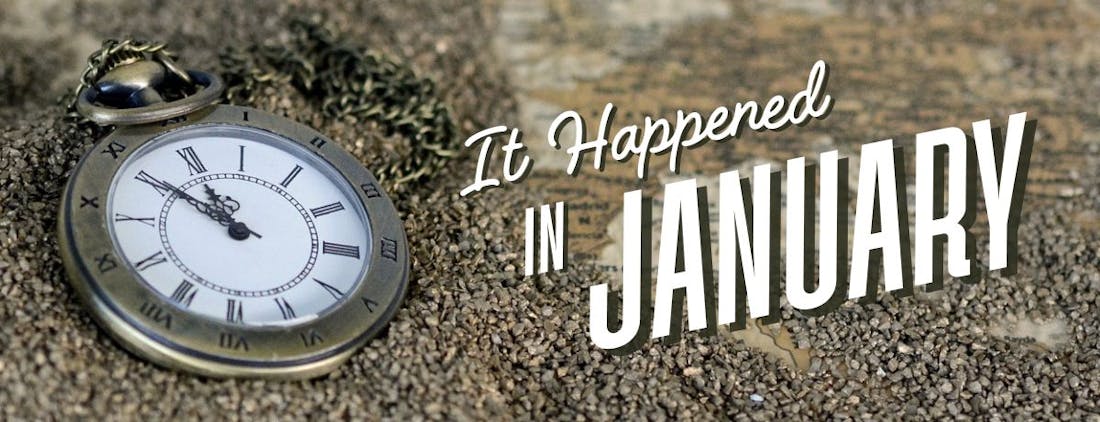
View Historical Events by Day: What Happened on January 6 in History?
Explore the historical events that shaped our world on January 6th. From major milestones to cultural achievements, see what happened on this day in history. Dates for earlier events may be approximate.
Note: Sources for the historical content shown, include research and reviews of relevant Online History Resources or printed material. When possible, we show a link to a source which provides additional or unique perspective about the event.
We do our best to provide accurate information but would appreciate being notified if any incorrect information is found. You may do so by using our Feedback link.
According to some Christian traditions, the Baptism of Jesus Christ in the Jordan River occurs.
Alfred the Great leads the West Saxon army to repel a Danish invasion at the Battle of Ashdown.
Otto I is crowned Holy Roman Emperor by Pope John XII in Rome.
Edmund Ironside, King of England, dies, solidifying Cnut the Great's rule over England.
Harold Godwineson, head of the most powerful noble family in England, is crowned King Harold II, following the death of Edward the Confessor, leading to a war of succession involving Tostig, brother of Harold, King Harald III Hardraade of Norway and William, duke of Normandy. King Harold managed to fight and kill Tostig and King Harald III at the Battle of Stamford Bridge near York but was himself soon defeated and killed by William at the Battle of Hastings. Almost a year after Edward the Confessor's death, on Christmas Day, 1066, William the Conqueror was crowned the first Norman king of England. More
Henry I of England marries Matilda of Scotland, consolidating his rule after the turmoil following his brother's death.
Richard I (Richard the Lionheart) of England is crowned at Westminster Abbey.
King John of England marries Isabella of Angoulême.
Louis VIII of France enters into negotiations with Henry III of England for the release of English lands in France.
The Council of Vienne begins, discussing various church matters including the Templar Order.
The Treaty of Edinburgh-Northampton is signed, recognizing Scottish independence from England.
The House of Commons convenes for the first time in England.
The Treaty of Calais is signed, ending the first phase of the Hundred Years' War between England and France.
Richard II of England begins his reign as king at the age of 10 following the death of his grandfather, Edward III.
An earthquake strikes Cyprus, causing significant damage and loss of life.
King Henry IV of England declares Owain Glyndŵr a traitor and offers a reward for his capture.
Pope Gregory XII issues a papal bull against the Avignon Pope, Benedict XIII, as part of efforts to end the Western Schism.
The Medici family gains power in Florence as Giovanni de' Medici becomes head of the family's bank.
The Council of Constance condemns the teachings of Jan Hus, leading to his trial for heresy.
The Council of Constance elects Cardinal Oddone Colonna as Pope Martin V, effectively ending the Western Schism.
The University of Basel is founded in Switzerland.
King Alfonso V of Aragon establishes the University of Barcelona.
The Congress of Arras opens, aiming to negotiate peace between Burgundy and France.
Alfonso V of Aragon is crowned King of Sicily, consolidating his control over the Italian peninsula.
Mehmed II ascends the throne as Sultan of the Ottoman Empire after the death of his father, Murad II.
The Siege of Belgrade begins, with Hungarian and Serbian forces defending the city against the Ottomans.
1458, January 6 - Alfonso V of Aragon takes control of the Kingdom of Naples after his victory over René of Anjou.
Nicolaus Copernicus, the astronomer who proposed a heliocentric model of the universe, is born in Poland.
Ivan III of Russia launches the Great Stand on the Ugra River, halting the advance of the Golden Horde.
The funeral of Henry VI of England takes place in Windsor.
Portuguese explorer Gaspar de Lemos reaches the Bay of Guanabara in Brazil.
The cornerstone of the Sistine Chapel's ceiling is laid in the Vatican City.
Christian II is crowned King of Denmark and Norway.
French explorer Jacques Cartier lands in Newfoundland, marking the beginning of French exploration in North America.
King Henry VIII of England marries Anne of Cleves, a marriage that will be annulled after a few months.
The Council of Trent concludes its discussions on the Counter-Reformation.
King Frederick II of Denmark establishes a Lutheran state church in Norway.
The Union of Arras unites Catholic provinces in the southern Netherlands against the Calvinist Dutch Revolt.
Sir Francis Drake takes the fort at Santo Domingo in the Caribbean, capturing it briefly.
The Spanish galleon "Nuestra Señora de Atocha" sinks off the coast of Florida with a significant cargo of treasure.
Jean-Baptiste Colbert, the French minister of finance, creates the Académie Royale d'Architecture.
The Spanish ship San Jose y las Animas sinks off the coast of Florida, becoming a subject of treasure hunting.
The first copyright legislation is enacted in Great Britain, known as the Statute of Anne.
The Battle of Rio de Janeiro sees Portuguese forces repel a French attack during the War of the Spanish Succession.
The Royal Colony of North Carolina issues a legislative act offering £1,000 for the capture of pirate Blackbeard.
The Ordinance of 1787 is passed, establishing the Northwest Territory and laying the groundwork for the eventual creation of new states.
The National Trust for Places of Historic Interest or Natural Beauty is founded in England.
The first all-glass windowless building, the Owens-Illinois Glass Company, is completed in Toledo, Ohio.
Franklin D. Roosevelt delivers his "Four Freedoms" speech during the State of the Union Address.
Pro-Trump supporters storm the United States Capitol in a violent insurrection, disrupting the certification of Joe Biden's presidential victory forcing lawmakers into hiding. Most of the rioters had come from a nearby rally where Trump urged them to “fight like hell.”






.png?auto=format,compress&fit=crop&w=280&h=280&q=93)








.jpg?format,compress&fit=crop&w=280&h=280&q=93)
.jpg?format,compress&fit=crop&w=280&h=280&q=93)









